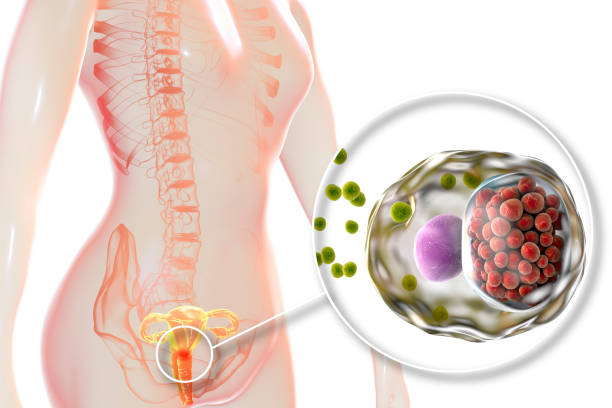
If you’re a woman, the occasional vaginal infection is to be expected. In fact, there are multiple types of vaginal infections that women can get. It is normal to have a vaginal infection from time to time, but if you are having infections more than four times a year, you should see a gynecologist get a more personalized treatment plan, and stop the frequency of infection.
In this article, we discuss the 3 most common vaginal infections and how to treat them, as well as where you can go in North Miami, FL, to receive excellent gynecologic care from a board-certified gynecologist.
1. Vaginal Candidiasis (“Yeast Infection”)
| Fungalimbalance in the vagina |
The most common type of vaginal infection is a yeast infection, caused by the Candida albicans(C. albicans) fungus. Candida is a type of yeast naturally present in many places on the body, typically on the skin, and in moist areas. Candida can be found in men’s and women’s bodies, and it is also present in the vagina.
An overgrowth of candida leads to a yeast infection. Hormone changes (especially high estrogen levels), high blood sugar levels, antibiotic use, and a weakened immune system are all factors that can contribute to an overgrowth of candida.
Signs and symptoms of a yeast infection include:
- Thick, white, odor-free discharge that can be lumpy or watery
- Vaginal itchiness, possibly leading to swelling and redness of the vulva
Although it is not considered a sexually transmitted infection (STI), yeast infections can be spread to a sexual partner through sexual contact. Men can also get a yeast infection, which can lead to an inflammation of the head of the penis or balanitis. In addition, having sexual intercourse with a yeast infection can prolong or even worsen the infection.
Treatment involves applying antifungal medication to the vagina – in topical or suppository form – or taking a pill. There is an abundance of over-the-counter options available, so be sure you’re choosing the right one for you. Another reason it’s important to see your gynecologist about yeast infection is that your infection is caused by a different type of fungus other than C. albicans, it may require a different, more aggressive treatment plan.
2. Bacterial Vaginosis (“BV”)
| Bacterial imbalance in the vagina |
Bacterial vaginosis, or BV, is another very common vaginal infection. It occurs due to the overgrowth of one of the several types of bacteria normally found in the vagina. When one of these types grows out of control, it can disrupt the balance of bacteria and fungi in the vagina. Sometimes, women do not have any symptoms even though they have an active infection. Other times, BV can cause symptoms like:
- Thin vaginal discharge that may have a strong fishy odor
- A smelly odor that is especially noticeable after vaginal sex
- Mild irritation or itchiness
- Burning sensation when you urinate
Vaginal douching, intrauterine devices, and antibiotic use can disrupt the bacterial balance in the vagina and lead to BV. While bacterial vaginosis is not transmitted by sex, sexual activity is associated with an increased risk of developing BV. That’s especially true when you have sex with someone new or with multiple partners because everyone has a unique genital chemistry, which can disrupt bacterial levels in the vagina.
Bacterial vaginosis cannot be transmitted to a male sexual partner because once transmitted to a male the bacteria does not have a moist, enclosed environment to grow in like the vagina. However, men can temporarily carry the bacteria on their penis after having sexual contact with a female partner with BV.
The treatment for BV is typically a course of antibiotics, which may be taken orally or as a gel/cream inserted into the vagina. However, if you experience repeat or persistent bacterial vaginosis, ask your gynecologist about what additional therapies or supplements you can take to help prevent reinfection.
Another reason to see a gynecologist when you think you have a vaginal infection is it may be hard to determine what type of infection you have – and what type of treatment you need – as yeast infections and BV have similar symptoms. Antifungal medications do not work on BV, so you could end up wasting your money on over-the-counter antifungal medications if you thought you had a yeast infection but you really have BV. Seeing a gynecologist can help you determine which medication you need and help you get relief faster.
3. Trichomoniasis (“Trich”)
| Parasitic infection transmitted through sexual activity |
Trichomoniasis is a sexually transmitted infection (STI) caused by the parasite Trichomonas vaginalis, which can live in semen as well as vaginal fluid. Trichomoniasis typically develops after unprotected vaginal sex with an infected person, or from sharing sex toys. Ejaculation isn’t necessary for the transmission of the parasite to occur – intimate contact is all that is needed. Trichomoniasis infections can develop in men and women.
Signs and symptoms of trichomoniasis include:
- Irritation or itchiness of the vagina/vulva or penis
- Burning or discomfort when urinating
- Discharge from the penis or vagina that may have an unpleasant or fishy smell
However, most people with trichomoniasis have no symptoms at all. Many STI screenings do not normally include a test for trichomoniasis, so be sure to ask your gynecologist if you suspect trichomoniasis or would like to rule it out.
Trichomoniasis is a very common STI that is entirely curable. Antibiotics are key – and both sexual partners should be treated for the infection. The good news is that usually, just one dose of antibiotics is all that is required to get rid of trichomoniasis.
Gynecologist in Miami, FL
At Levin’s Women’s Health & Wellness Center in North Miami, Florida, we regularly counsel women on a variety of gynecology issues, including the 3 most common vaginal infections and how to treat them.
Get the proper gynecologic care you deserve by making an appointment with one of our board-certified gynecologists at Levin’s Women’s Health & Wellness Center in North Miami. Call us today at (305) 981-0231, or request an appointment here. If you are an existing patient, we invite you to book a virtual telehealth visit for the quickest and most convenient gynecology care. We look forward to treating you and helping you take charge of your gynecologic health!
